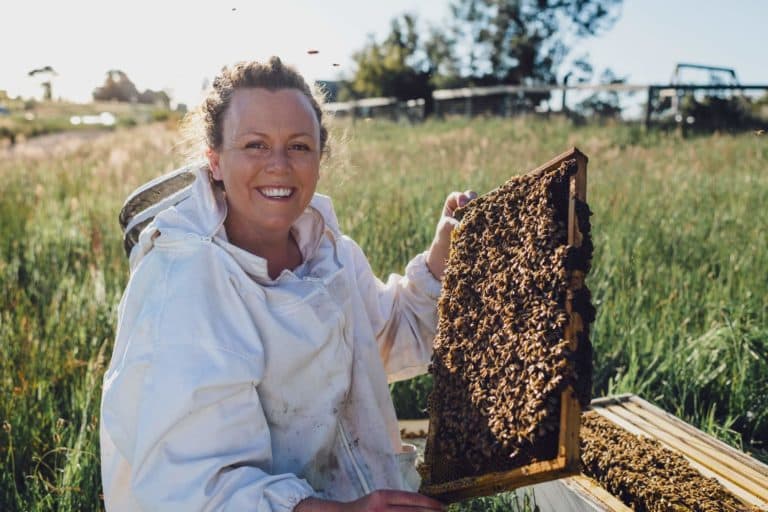Former stockbroker turned farmer, Claire Moore is obsessed with bees. An obsession that sees her breeding genetically diverse queen bees, advocating for bee populations and teaching beekeeping to at-risk youths in the justice system.
It’s all part of her passion for food security, and for contributing to the research and other efforts aimed at supporting bee populations that are currently at risk on multiple fronts. Bees, she likes to remind people, are known as the “canaries in the coal mine” for agriculture and horticulture, with the UN declaring in 2019 that the world’s honey bee population is in crisis.
It was this work that saw Claire named the 2019 AgriFutures Rural Women’s Award VIC Winner and National Runner Up. Based in Kyneton in Victoria, Claire’s farm is a “true family farm”, featuring 1200 chickens and Claire working with her partner Paul and three young children 365 days a year, with the kids collecting eggs and selling them at the local market.
Claire has since used the Westpac bursary she received as part of the award to further study commercial beekeeping, queen rearing and genetics. She’s also bought bee hives with different genetics to set up apiaries in her hometown.
Bees have suffered a widespread loss of habitat in recent years, including during the summer bushfires. The diversity and abundance of bees are also at the mercy of a changing climate. The loss of such bees impacts the ability to grow crops, given the role bees have in pollinating crops like apples, avocados and blueberries.
Meanwhile, Australia is the only country in the world that doesn’t have the Varroa mite, which feed on the fat stores of bees. Claire believes it’s only a matter of time before Varroa arrives on our shores. She says that if bees can keep cleaner hives, or remain more “hygienic” as it’s known in the bee world, then when Varroa does arrive we’ll have a better chance of protecting bees against it.
Claire is known for being at the cutting edge of the bee industry, working with the University of Melbourne and Victoria’s Department of Agriculture on a number of key research projects in bee genetics and emerging biosecurity challenges. She does this on top of her work, personally breeding genetically diverse queen bees, an option she chooses to do over ‘beekeeping for honey’, given the opportunities such breeding has for addressing food security.
“Queen breeding is such a fascinating process, the process of grafting new queens never gets old! Bees are amazingly intelligent creatures,” she says.
Claire says her interest in bees started young, with a family rental house giving her the first opportunity to engage with bees.
“Even as a very small child I found bees very fascinating and exciting,” she says. “I was so pleased when I moved to a rental house that would let me get bees in suburban Melbourne. I could not have dreamt at the time that the first small swarm would lead me to where I am today.”
But Claire came into this work after a very different career elsewhere. Having grown up in a small Victorian town near the Great Ocean Road, she later graduated with a Bachelor of Arts, majoring in political science, and entered the finance sector, spending a decade working in stockbroking.
She purchased her first hive in 2007 — taking it home in a two-door hatchback, which saw plenty of bees escaping in the process.
Later as the Global Financial Crisis hit, Claire lost her job in finance. Her partner Paul also suffered a major health scare. In need of work and new opportunities, they turned to farming.
But it took her some time to find her feet, especially while raising a young family.











